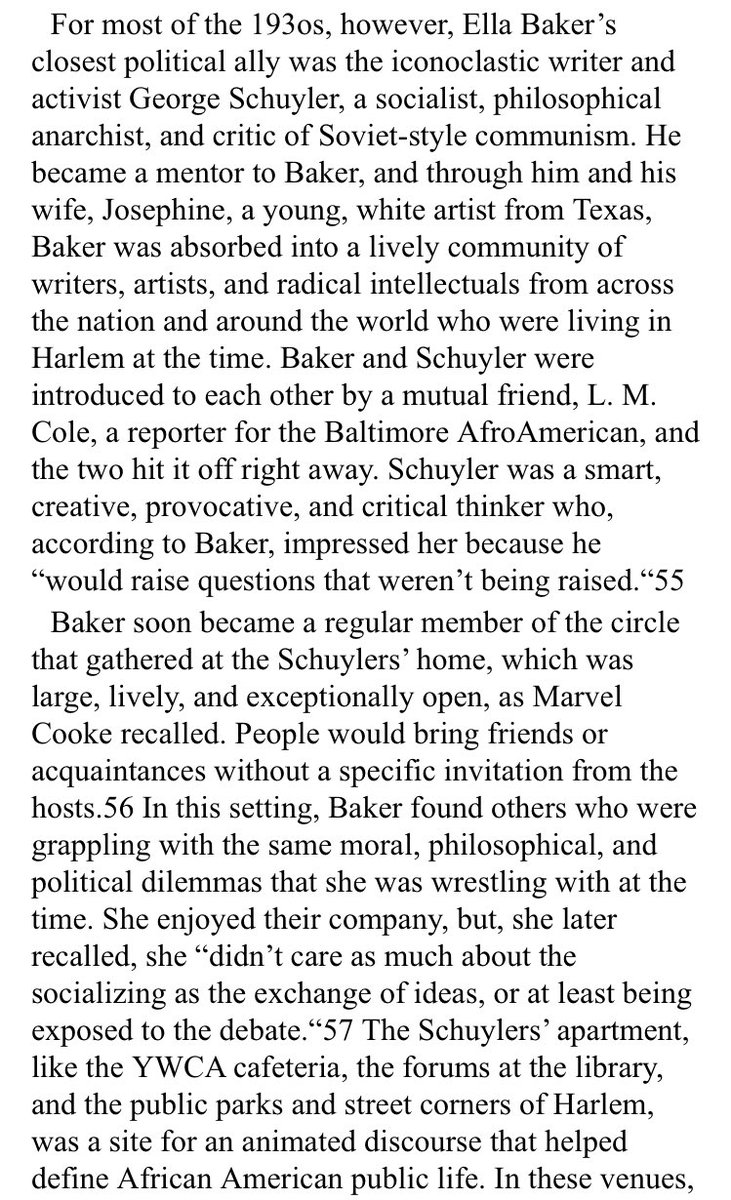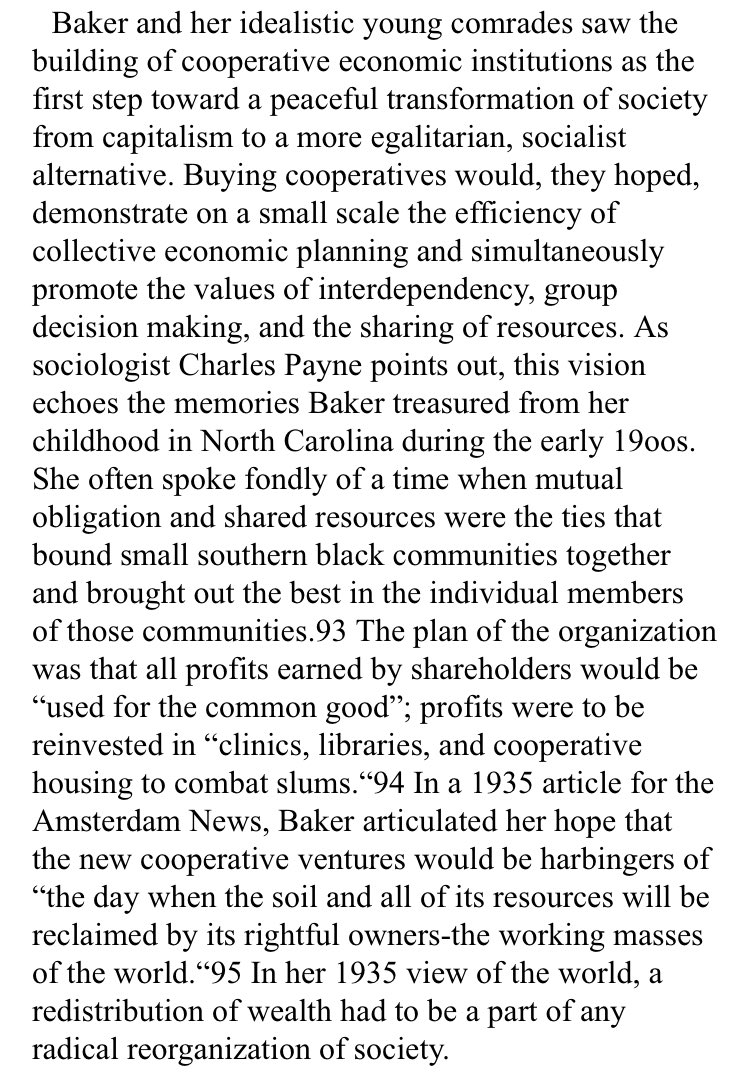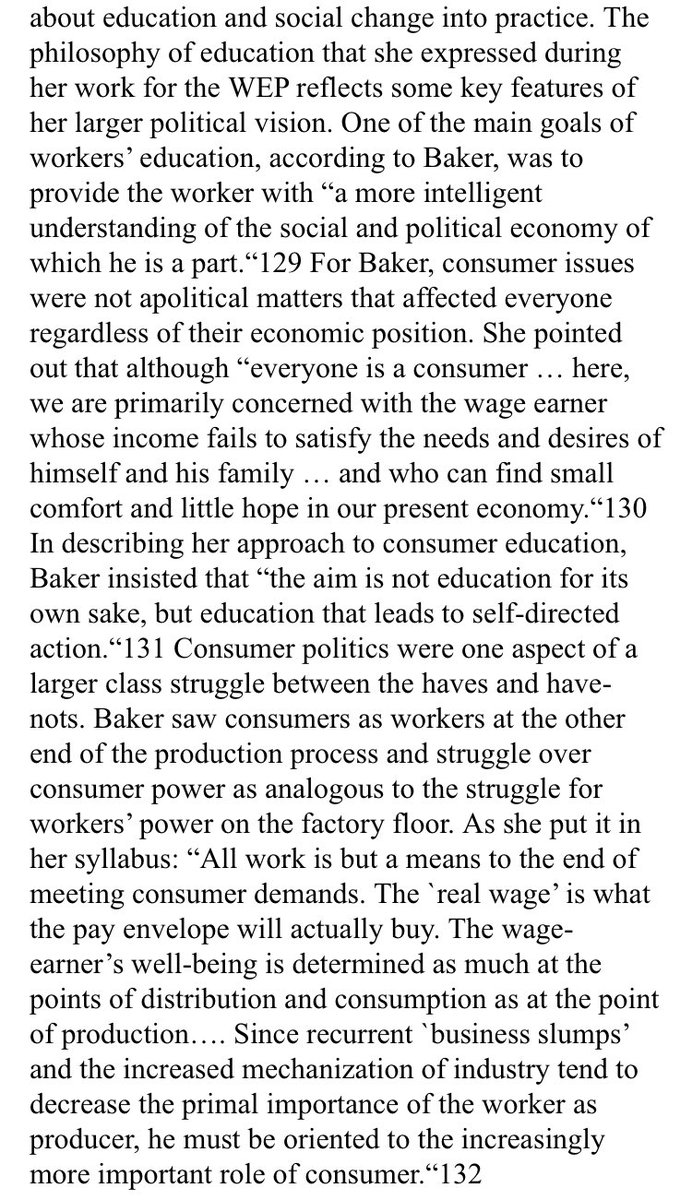Ella Baker’s socialist views are still largely ignored by most of the American Left, and y’all might not understand how much of our swag comes from her, so we decided to put together a thread of some highlights from Barbara Ransby’s “Ella Baker and the Black Freedom Movement.” 😎 

“As an adult, Baker said that the socialist principle – to each according to need, from each according to ability – was very much in operation in her childhood community. She ‘grew up out of more or less kind of a Socialistic bit of thinking ... ‘[but it was] not called such.’” 

“[Ella Baker] combined the Black Baptist missionary values of charity, humility, and service with the economic theories of Marxists and Socialists ... who advocated a redistribution of society’s wealth and a transfer of power from [Capitalists] to the poor and working classes.” 

“For most of the 1930s ... Ella Baker’s closest political ally was the iconoclastic writer and activist George Schuyler, a Socialist, philosophical Anarchist, and critic of Soviet-style [‘Communism.’] He became a mentor to Baker...” 

“[Ella Baker and the YNCL] viewed the cooperative movement as much more than a survival strategy to ameliorate the suffering of a handful of Black participants; it was a vital, practical proving ground for the socialist principles of communalism and mutual aid.” 

“Baker and her idealistic young comrades saw the building of cooperative economic institutions as the first step toward a peaceful transformation of society from Capitalism to a more egalitarian, socialist alternative.” 

“... the YNCL’s leaders had their own vision, however elusive, of how their efforts could transform society and eradicate Capitalism. George Schuyler was firm and outspoken in his condemnation of the evils of modern Capitalism, and Ella Baker shared that critique.” 

“Baker did not share all of [George] Schuyler’s views ... she did share his optimism about the [co-op] movement, proclaiming ... ‘from economic planning must spring our second emancipation.’ For the rest of her life she challenged the inequities inherent in a capitalist society.” 

“Baker and Schuyler were heirs to a long tradition of mutual aid in the African American community and many Black organizers had seen cooperatives as an avenue for economic improvement.” 

“... the cooperative philosophy resonated with many of the ideals that were instilled in [Baker] as a child. She brought her memories and ideals of community solidarity in the rural South to bear on the predicament in which she found oppressed Black people in the urban North.” 

“Unlike such singular events as voting on election day or attending a political rally, involvement in cooperatives and buying clubs enabled people to redefine the ways in which they related to neighbors, friends, and co-workers.“ 

“Her experience as a student and teacher at the Rand School was another part of Baker’s deepening involvement in and exposure to Leftist politics in New York City.
In the WEP office where Baker worked, there were constant debates ... about ... the future of Socialism...”
In the WEP office where Baker worked, there were constant debates ... about ... the future of Socialism...”

“One of the main goals of workers’ education, according to Baker, was to provide the worker with ‘a more intelligent understanding of the social and political economy of which he is a part.’” 

“She clearly saw her work as a part of a bigger process of social and economic change along socialist lines.
The WEP exposed Baker to the entire spectrum of Leftist political ideologies and factions. She was a careful observer and critic of the Left...”
The WEP exposed Baker to the entire spectrum of Leftist political ideologies and factions. She was a careful observer and critic of the Left...”

“Baker was well informed about Left political theory and questioned all the viewpoints. She read and debated Marxist ideas regularly with her coworkers in the WEP, but she was never known to toe a ‘party line’ of any type. Indeed, she was a vigorous opponent of sectarianism...” 

“[Ella Baker] was a harsh critic of Capitalism, but resisted any hints of sectarianism or ideological orthodoxy. She loathed dogma of any kind and was openly critical when she observed this kind of rigid thinking on the part of friends and colleagues.” 

PS: Did you know that the Southern Leadership Conference on Transportation and Nonviolent Integration changed their name to the “Southern Christian Leadership Conference” so that they wouldn’t be targeted as Communists siding with the Soviet Union? 

We thank you for your wonderful work, @BarbaraRansby!!! Our history cannot be forgotten!!! ❤️
• • •
Missing some Tweet in this thread? You can try to
force a refresh





